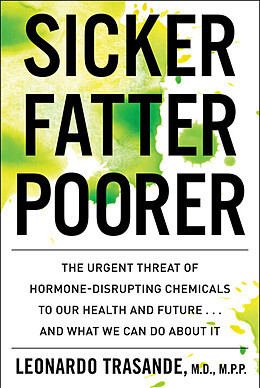A leading voice in public health policy and pioneering environmental medicine scientist reveals the alarming truth about how hormone-disrupting chemicals are affecting our daily lives—and what we can do to protect ourselves and fight back. In his new book, Dr. Leonardo Trasande, a pediatrician, professor, and world-renowned researcher, tells the story of how our everyday surroundings are making us sicker, fatter, and poorer.
Dr. Trasande exposes the chemicals that disrupt our hormonal systems and  damage our health in irreparable ways. He shows us where these chemicals hide—in our homes, our schools, at work, in our food, and countless other places we can’t control—as well as the workings of policy that protects the continued use of these chemicals in our lives. Drawing on extensive research and expertise, he outlines dramatic studies and emerging evidence about the rapid increases in neurodevelopmental, metabolic, reproductive, and immunological diseases directly related to the hundreds of thousands of chemicals that we are exposed to every day. Unfortunately, nowhere is safe.
damage our health in irreparable ways. He shows us where these chemicals hide—in our homes, our schools, at work, in our food, and countless other places we can’t control—as well as the workings of policy that protects the continued use of these chemicals in our lives. Drawing on extensive research and expertise, he outlines dramatic studies and emerging evidence about the rapid increases in neurodevelopmental, metabolic, reproductive, and immunological diseases directly related to the hundreds of thousands of chemicals that we are exposed to every day. Unfortunately, nowhere is safe.
In this webinar Dr. Jerry Heindel, director of Commonweal’s Program in Endocrine Disruption Strategies, interviewed Dr. Trasande about his research, his commitment to effecting change, and how this book can help. Through a blend of narrative, scientific detective work, and concrete information about the connections between chemicals and disease, he showed us what we can do to protect ourselves and our families from hormone-disrupting chemicals in the short-term, and how we can help bring about the large-scale change that limits this threat to our health.
Featured Speaker
 Leonardo Trasande, MD, MPP is Jim G. Hendrick, MD Professor, Vice Chair for Research in the Department of Pediatrics, and Chief of the Division of Environmental Pediatrics at NYU School of Medicine. He also directs the NYU Center for the Investigation of Environmental Hazards. His research focuses on organic contaminants as endocrine disruptors. Dr. Trasande leads one of 35 centers across the country as part of the National Institute of Health’s Environmental Influences on Child Health Outcomes (ECHO) program. He is PI of studies on preconceptual, prenatal and childhood phthalate and bisphenol exposures in the Rotterdam-based Generation R cohort as well as another project studying the effect of these dietary contaminants in children with chronic kidney disease. He is also Principal Investigator for a research project comparing neurodevelopment, cardiometabolic and respiratory profiles of children exposed in utero to the World Trade Center disaster to a comparison group (U01OH011299).
Leonardo Trasande, MD, MPP is Jim G. Hendrick, MD Professor, Vice Chair for Research in the Department of Pediatrics, and Chief of the Division of Environmental Pediatrics at NYU School of Medicine. He also directs the NYU Center for the Investigation of Environmental Hazards. His research focuses on organic contaminants as endocrine disruptors. Dr. Trasande leads one of 35 centers across the country as part of the National Institute of Health’s Environmental Influences on Child Health Outcomes (ECHO) program. He is PI of studies on preconceptual, prenatal and childhood phthalate and bisphenol exposures in the Rotterdam-based Generation R cohort as well as another project studying the effect of these dietary contaminants in children with chronic kidney disease. He is also Principal Investigator for a research project comparing neurodevelopment, cardiometabolic and respiratory profiles of children exposed in utero to the World Trade Center disaster to a comparison group (U01OH011299).
He has served as a member of numerous scientific committees and expert panels, including: the American Academy of Pediatrics’ Executive Committee of the Council for Environmental Health; the Science and Technical Advisory Committee for the World Trade Center Health Program; the National Children’s Study Methodological Review Panel of the National Academy of Sciences; the United Nations Environment Programme Steering Committee on a Global Outlook for Chemicals; and the Board of Scientific Counselors for the National Center for Environmental Health at the Centers for Disease Control and Prevention (CDC).
This webinar is one in a monthly series sponsored by the Collaborative on Health and the Environment’s EDC Strategies Partnership. The CHE EDC Strategies Partnership is chaired by Carol Kwiatkowski and Katie Pelch (TEDX), Sharyle Patton (Commonweal Biomonitoring Resource Center), Jerry Heindel (Commonweal Program on Endocrine Disruption Strategies), and Genon Jensen (HEAL) and coordinated by Maria Williams (Collaborative on Health and the Environment, a Commonweal program). To see a full list of past calls and webinars related to EDCs and listen to or view recordings, please visit our partnership page.
This webinar was moderated by Jerry Heindel, PhD, Director of the Commonweal Program on Endocrine Disruption Strategies. It lasted for 30 minutes and will be recorded for our call and webinar archive.
